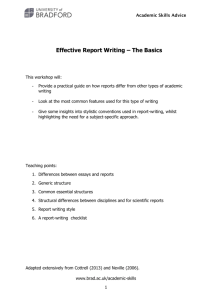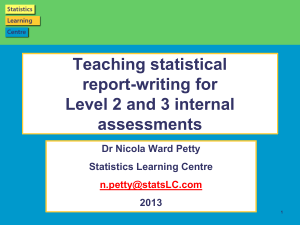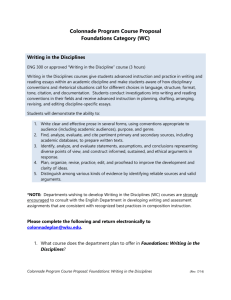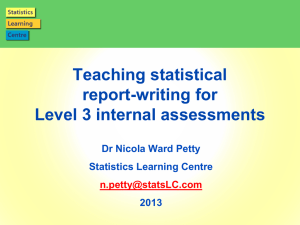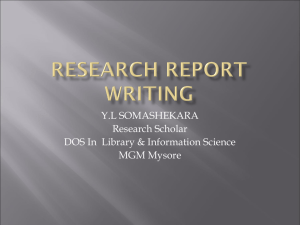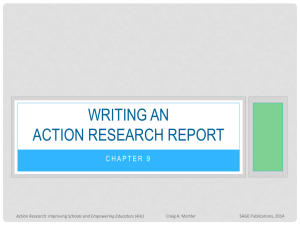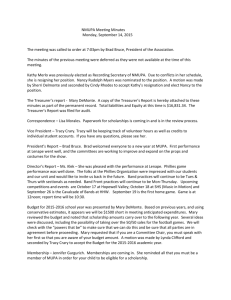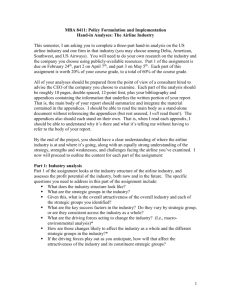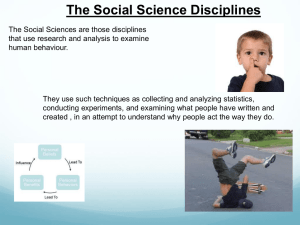Eff-Report-Writing - University of Bradford
advertisement
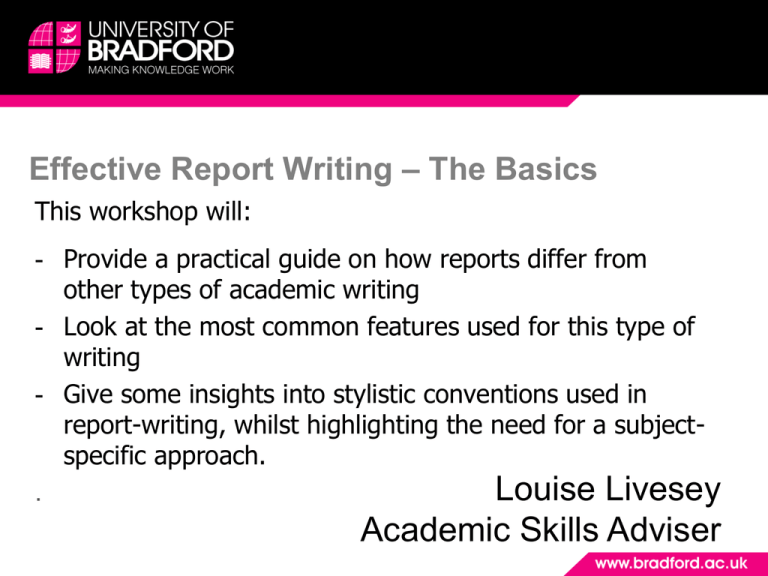
Effective Report Writing – The Basics This workshop will: - Provide a practical guide on how reports differ from other types of academic writing - Look at the most common features used for this type of writing - Give some insights into stylistic conventions used in report-writing, whilst highlighting the need for a subjectspecific approach. Louise Livesey . Academic Skills Adviser Today’s Plan 1.Differences between essays and reports 2.Generic structure 3.Section content 4.Structural differences between disciplines and for scientific reports 5.Report writing style 6.A report-writing checklist 1.Differences between essays and reports • Essays = ideas, concepts, hypothetical notions • Reports = actualities rational reality, highly structured, standardised format – – – – – Analysis based More descriptive Summative Predict Recommend 2.Generic structure Title Acknowledgements Abstract Contents Tables and illustrations Background/context Review of literature Methodology and methods Measurement criteria Results Discussion Conclusion Recommendations References Bibliography Appendices 2.Generic structure Common Essential Structures • Introduction • Background/Context • Development & Analytical Process (Methodology) • Discussion • Conclusion 3.Section content • • • • • • • • • Abstract: summary and experimental report Introduction: aims and structure Background/context: why this project Review of literature: most important writings Methodology and method: research conduct and participants/items Discussion: evaluation, explain results, limitations Conclusions/recommendations: sum up project and future research References: of all sources Appendices: documentation 4. Structure differences between disciplines and for scientific reports • • • • • • • (Abstract [summary of whole report]) Aim (purpose of experiment, title, hypothesis) Method (practical details, any difficulties) Results (observations, calculations) Discussion (critical evaluation) Conclusion (summary of findings) References 4. Structure differences between disciplines and for scientific reports Your department might have specific requirements for the structure of your reports – be sure to check and follow any instructions they give you. 5.Report writing style Conventions for all academic writing • • • • No abbreviations Be clear and concise Be objective Additional: − No contractions/colloquialisms/rhetorical questions − Do not overstate evidence − Use passive voice 5.Report writing style Conventions for academic report writing • • • • • • • Use italics, upper case, etc. appropriately Use appropriate tenses Be accurate Consistent and accepted abbreviations Clear and concise Be objective No contractions/ colloquialisms/ rhetoric/ overstating • Use passive 6.A report writing checklist 1. Report meets assignment brief and marking criteria 2. Title worded precisely and reflects report Abstract Contents page Introduction Literature Review Research Method Results Conclusions/Recommendations Appendices Activity 3: What else do you need? References CALT Learning. (2007) Writing More Objectively. Victoria: Monash University. [online] Available at: http://www.monash.edu.au/lls/llonline/writing/science/1.6.xm l [Accessed 23.6.2014] Cottrell, S. (2013) The Study Skills Handbook. 4th Ed. Basingstoke: Palgrave Macmillan. Neville, C. (2006) Report Writing. Bradford: University of Bradford. [online] Available at: http://www.brad.ac.uk/management/media/management/els /Report-Writing.pdf [Accessed 23.6.2014] Academic Skills Advice Service • Where are we? Chesham Building B0.23 • What do we do? Support undergraduate students with their academic skills by running clinics and workshops, having bookable appointment slots, and enabling students to drop-in for Instant Action. • Who are we? Michael and Helen specialise in Maths Support; Lucy and Russell advise students on academic study skills; and I (Louise) deliver the workshops • When can you come for help? Everyday both face to face and on-line • How do I get in touch? Email: academicskills@brad.ac.uk or website www.brad.ac.uk/academicskills Any questions?
